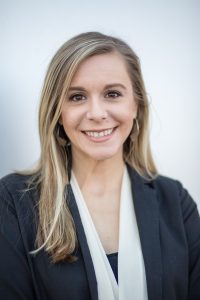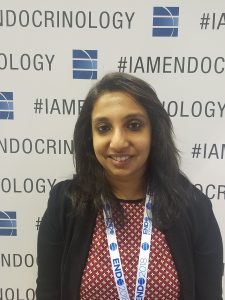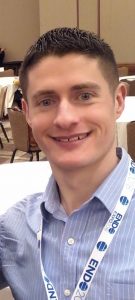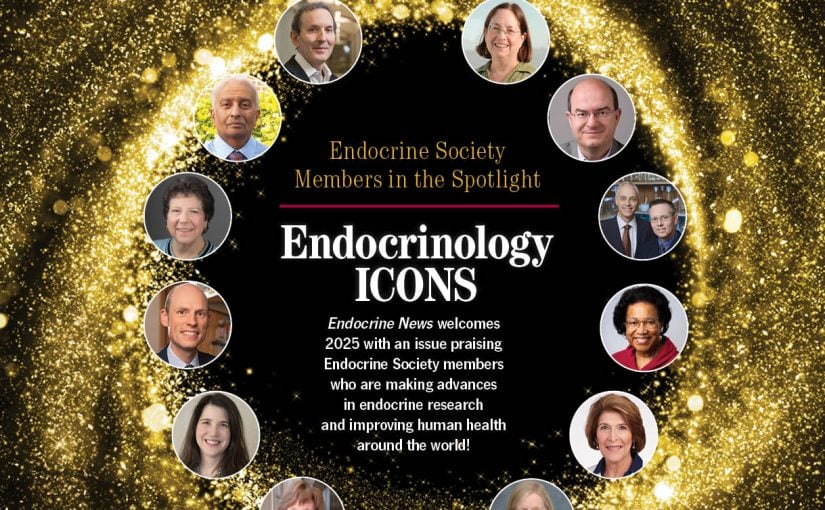Each year, ENDO attendees have the opportunity to witness the up and coming talent in the world of endocrine science as they present their research at the Knock Out Rounds. Endocrine News spoke to this year’s winners, Angela Odle, Juilee Rege, and Daniel Ferguson about their experience, their research, and their futures.
One of the highlights of ENDO 2018 was the game show-like atmosphere of the Knock Out Rounds, where more than a dozen young researchers did their best to persuade a panel of judges that their three-minute presentation was the best.
Since its debut at ENDO 2016 in Boston, the Knock Out Rounds have proven to be one of the most popular events at the conference. This year, 13 early career basic science researchers were pitted against each other as they presented short, focused presentations highlighting the rationale for their science rather than strictly focusing on the outcomes. Each contestant was allowed only three minutes per presentation along with a single slide to illustrate their work.
Serving on the panel of judges were Jonna Frasor, PhD, Department of Physiology and Biophysics, University of Illinois at Chicago; Gregory A. Brent, MD, UCLA; and yours truly, representing Endocrine News. Once again, the event was kept on track and on time by the Endocrine Society’s own chief communications and marketing officer, Aaron Lohr.
“These were all very talented young researchers who did a great job presenting their research in engaging and easy-to-understand terms,” Frasor says. “This is such an important skill for researchers to make a lay audience really understand the work that they do in the lab day in and day out. Each of these researchers did a remarkable job. I was thoroughly engaged.”
This year, Angela Odle a postdoctoral research fellow in the Department of Neurobiology and Developmental Sciences at the University of Arkansas for Medical Sciences, in Little Rock was the first-place winner, as well as the People’s Choice winner, which was decided by online voting of those in the audience who voted via the ENDO 2018 app on their phone. Second place honors went to Juilee Rege, a postdoctoral fellow in the laboratory of Dr. Bill Rainey in the Department of Molecular and Integrative Physiology at the University of Michigan, Ann Arbor. Daniel Ferguson, a postdoctoral research scholar in the Internal Medicine Division of Endocrinology, Metabolism, and Lipid Research at Washington University School of Medicine in St. Louis placed third. They took time from their busy research projects and navigating the sessions in McCormick Place to share their thoughts about their presentations, their research, and what they see for the future of their research as well as their careers in endocrinology.
What was it like explaining your research to a room full of scientists and clinicians?

Angela Odle: I was surprised by how much fun I had both participating in and listening to the KO Rounds. We are all so used to talking about our research on a day-to-day basis with people in our own little world that we can sometimes forget how much jargon we actually use. I enjoyed the challenge of trying to make everyone in the room understand the basis of my work. I felt like the organizers did a great job of creating a positive atmosphere and making the session enjoyable for everyone.
Juilee Rege: The Knock Out Rounds was a fun experience. Explaining my research to scientists and clinicians not in my area of research was challenging but exciting. I think that the format of the Knock Out Rounds was a great tool to get people with other endocrinology backgrounds interested in the research that I do. I am glad I could communicate the clinical and translational significance of my research to a broad scientific audience.
Daniel Ferguson: It was a bit intimidating, but I really do appreciate the prospective of both researchers and clinicians.
With the current rates of obesity in our country, both in children and adults, we need to address increasing complexity of reproductive difficulties. It is crucial that we define the mechanisms behind impaired fertility in obese and overweight populations. – Angela Odle
How did you prepare differently once you learned more about the Knock Out Rounds?
AO: We were instructed not to summarize our posters/abstracts, so I was careful not to include too much data from the start. However, what little data I did include initially had to be edited even further once I realized I couldn’t possibly give enough background for each different component. I only included one type of data that I felt was interesting and representative of the kind of work that we do in our lab. Keeping a talk down to three minutes is challenging! I wrote down everything I wanted to say, and then kept cutting, editing, and practicing until I could consistently stay within the time limit.
JR: The Knock Out Rounds is a difficult but exciting concept where you get only three minutes and one slide to convey your research to a lay-audience. It is challenging for researchers to communicate their work and its implications in a way that is accessible and meaningful to a broad audience. The Knock Out Round audios from the previous ENDO meetings posted on the ENDO website definitely helped me to exactly understand what needed to be highlighted in my talk. As far as the preparation was concerned, I tried to put forth my science in such a way that it was simple and less jargon-y. Input from my lab folks and an hour-long session with RELATE, a communications training and community engagement program on campus designed to improve the dialogue between researchers and different public audiences, helped significantly.
I am glad I could communicate the clinical and translational significance of my research to a broad scientific audience. – Juilee Rege
DF: The three-minute time limit was the biggest factor in deciding what did or didn’t get added into the talk and how to say it.
Tell us a little bit about your presentation and why you feel your study was so important.
AO: I spent the first part of my presentation discussing reproduction and nutrition, and how the two systems are thought to communicate. I made sure to point out what components are known, and what is still being investigated. I also felt that it was important to remind the audience WHY it is important that our reproductive system is capable of receiving signals about the body’s nutritional stores. I then focused in on the pituitary, where our research takes place. I introduced a hypothesis, showed one set of data, and then formed a conclusion based on that data.
With the current rates of obesity in our country, both in children and adults, we need to address increasing complexity of reproductive difficulties. It is crucial that we define the mechanisms behind impaired fertility in obese and overweight populations.

JR: My work focuses on the production of bioactive androgens in pre-pubertal children. Testosterone has been the conventional measure of androgen activity in pre-pubertal children all this while, but our study has pointed out that 11-ketotestosterone- an adrenal-derived 11-oxygenated derivative of testosterone – could in fact represent a major androgen source in this population. I feel this study is important because we need to expand our repertoire of biomarkers to include this new androgen for diagnosis of childhood androgen excess disorders for more accurate diagnosis and in turn better health outcome.
DF: The work is important because our treatment induces such a dramatic decrease in metabolic abnormalities (obesity, diabetes and fatty liver) associated with hormone deficiency, specifically leptin deficiency, and it can also be applied to lipodystrophy, which is a much larger patient population.
What are your future plans with the study that you presented at the Knock Out Rounds?
AO: I presented limited data on luteinizing hormone secretion from female mice with (normal) and without (mutant) gonadotrope leptin receptors, showing that our mutants did not produce a normal LH surge. I plan to use in vitro studies to show the mechanisms behind leptin’s actions in the gonadotrope, specifically with regard to this important hormonal event.

JR: I want to dive deep into the study of this novel derivative of testosterone at both molecular as well as translational level. In addition, I hope to apply this knowledge in not adrenal-related hyperandrogenic disorders in children and women.
DF: To publish the work.
Where do you see yourself in the next five years in the field of endocrinology?
AO: That is a tough question! I really enjoy the field I am in now. Researchers in the area of reproductive endocrinology are some of the most intelligent and generous scientists you will come across. I’d like to become an independent academic researcher with a strong spirit of collaboration. It is collaboration that has allowed our group to be successful and move out of our comfort zone into more cutting-edge territories. In five years, I imagine myself still attending the ENDO meetings, maybe as a young PI, sitting in the audience, voting for my student in the 2023 KO rounds.
My main passion is to perform translational research to solve problems in the clinic (bench to bedside). – Daniel Ferguson
JR: My long-term career goal is to establish a strong independent research program in the area of adrenal-related hyperandrogenism. My current goals all revolve around obtaining scientific independence, including obtaining funding. I have been exceptionally fortunate to have Dr. William Rainey and Dr. Richard Auchus at the University of Michigan as mentors who have 1) broadened my research horizons; 2) acquainted me with the strengths and weaknesses of various study designs and interpretations; 3) helped me develop a sense of self-critique towards my own work; 4) provided guidance on developing a service portfolio; and 5) encouraged me to maintain a work/personal life balance. I hope to continue this tradition as mentoring and establishing a legacy of successful mentees is very important to me.
DF: Not sure of the exact position but my main passion is to perform translational research to solve problems in the clinic (bench to bedside).
There was plenty of great science presented this year in Chicago by a host of enthusiastic researchers. Here’s a complete list of those who showed off their work in their labs to a roomful of their peers and mentors.
- Paula Aliberti, Hospital de Pediatria Garrahan, CONICET, Buenos Aires, Argentina
- Eleni Beli, PhD, IU School of Medicine, Indianapolis, Ind.
- Ashwini L. Chand, PhD, Olivia Newton-John Research Institute, Melbourne, VIC, Australia
- Daniel Ferguson, PhD, Washington University School of Medicine, St. Louis, Mo.
- Marcus Goncalves, MD, PhD, Weill Medical College/Cornell University, New York, N.Y.
- Elie Hobeika, MD, Division of Reproductive Endocrinology and Infertility, Department of Obstetrics and Gynecology, University of Illinois at Chicago, Chicago, Ill.
- Kimberly Keefe, MD, Massachusetts General Hospital, Boston, Ma.
- Marissa Kraynak, University of Wisconsin, Madison, Wisc.
- Janet Leung, MD, Virginia Mason Hospital and Medical Center, Seattle, Wash.
- Angela Katherine Odle, PhD, University of Arkansas for Medical Sciences, Little Rock, Ark.
- Juilee Rege, PhD, University of Michigan, Ann Arbor, Mich.
- Shikha Saini, PhD, University of Illinois at Chicago, Chicago, Ill.
- Yan Zhu, MD, Beth Israel Deaconess Medical Center, Boston, Ma.

